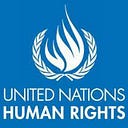Toilet is not a dirty word
Oyungerel Tsedevdamba is a human rights activist from Mongolia, who leads an NGO that provides sanitation solutions for local communities. Her aim is to change the taboo around toilets.
“I love to break taboos. That’s my hobby!”
Oyungerel Tsedevdamba is a human rights activist who has been breaking taboos to promote human rights in her native Mongolia. Since 2015, the former member of parliament and author has championed better sanitation as a means for improving the lives of Mongolians. The best way to do this, she said, is to tackle the taboo surrounding the word “toilet.”
“The word toilet is a very prejudiced word,” Tsedevdamba said. “In legal papers, advertisements, and in every day conversation, the word toilet doesn’t come out, until we ran a nationwide campaign.”
Tsedevdamba created am NGO called Local Solutions which has a two-pronged approach for changing attitudes and improving sanitation. First is to de-stigmatise the word “toilet.” The second was to educate people across Mongolia on toilet and toilet technologies.
Clean water and sanitation are indispensable to sustain development, UN High Commissioner for Human Rights Michelle Bachelet told an audience during an event to commemorate World Water Day. A report released this week by UN Water looking at the state of water and sanitation worldwide, shows that access to safe sources are still out of reach for much of the global population.
“The fact that billions of people still lack safe water and sanitation is not merely a development emergency, it’s a human rights failure,” she said.
Better toilets = better lives
In Mongolia, Tsedevdamba believes that access to safe and reliable sanitation is a matter of life and death and not just from disease. Each year poorly designed toilets, claim the lives of children and the elderly. The toilets amount to outdoor huts, with deeply dug trenches with planks of wood balanced precariously above them.
For example, during particularly bad flooding in the western part of Mongolia in 2016, Tsedevdamba learned that at least five children died from drowning in pit toilets. These deaths, she said were under-reported. She found out that police do not keep records of such deaths, labeling them simply as drownings because families will not report them because of the shame associated with toilets, she said.
“After hearing these death stories, I thought I wished to change (physical) toilets as soon as possible so that we can save one child’s life,” Tsedevdamba said.
Part of breaking the toilet taboo has been getting people to talk about toilets. Tsedevdamba and her team did this through trainings in local areas, as well as publishing a book on toilets. There was even a photo campaign (based on a book she wrote called “Let’s Change Our Toilets”) which had Tsedevdamba and others pictured in modern toilets while wearing the latest fashions by Mongolian designers.
She also helped produce a manual of types of toilets that could be constructed in different settings across the country. The NGO has also been working on ways to help communities and individuals to improve, import and adapt, finance and build their own better toilets.
“In the beginning, people were actually disgusted by what we were talking about,” Tsedevdamba said. “But the more we talked about it freely and in many good examples, the less became the prejudice. Soon people started seeing toilets in a very different way.”
Human rights no longer secret
Tsedevdamba grew up at a time when Mongolian society was communist “and there was no understanding of human rights.” She learned about human rights when she was in her 20s after receiving a “secret” document: the Universal Declaration of Human Rights (UDHR). She read that everyone had freedom of expression, the right to worship, and more. She decided everyone needed to know this and helped spread the word of human rights by talking about the UDHR to Mongolian nomadic herders in her native Khuvsgul province in 1990s.
“I should spread these words as far as possible, to as many people as possible so that everybody has their own immunity to protect their own rights in the future,” she said.
The UDHR helped fuel her own sharp sense of justice and standing up for the disenfranchised. She defended the rights of many people while leading a human rights watchdog Liberty Center in 2000s. Her passion for human rights made her a novelist, a public speaker and a member of the Mongolian parliament. Now she advocates for sanitation, water and clean air.
“I realize there are few people who can do what I do because they have many other worries and fears,” she said. “It does require some freedom and courage from me, but I can afford it thanks to the readers of my books and my family’s and team’s support.”
You can watch a short video of Tsedevdamba and her work here.
